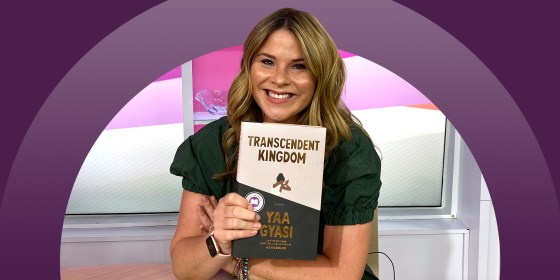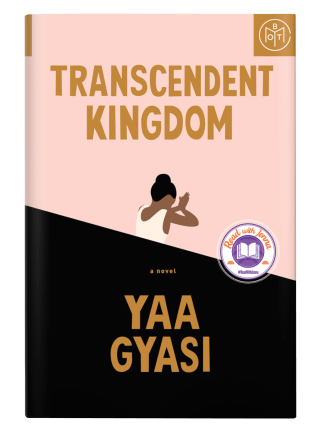Jenna Bush Hager's September book club pick, "Transcendent Kingdom" by Yaa Gyasi, is about a Ghanian family after they immigrate to Alabama. We meet the protagonist, Gifty, while she pursues her Ph.D. at Stanford University, researching the human brain.
"Transcendent Kingdom" by Yaa Gyasi
Her brother, Nana, has previously passed away from a heroin overdose after he was prescribed OxyContin for an ankle injury that led to an opioid addiction. Meanwhile, her gravely depressed mother is living in her bed. Gifty turns to science in a quest to understand the suffering she has experienced in her life. In her search for answers, she also finds herself pulled toward the evangelical faith in which she was raised.
When discussing her September selection Jenna said, "The fact that this book tackles the themes of mental health and race at this moment in our culture, I think will lead our book club to have some really important conversations."
To help spark that conversation among family and friends, Gyasi's publisher has provided twelve questions to consider after reading the touching novel.
- How do Gifty and her mother use prayer differently throughout their lives, and especially after Nana’s death? What variations of prayer do the two women discover in the novel?
- How does Gifty approach the moral predicament of running her science experiments on mice? What elements of her faith and sense of connection to God’s creations are evident in how she treats the mice?
- Consider the stigmas surrounding addiction, especially opioid addiction, the rates of which are exploding in today’s society. What other stigmas and expectations was Nana responding to by not asking for help to deal with his addiction, and others not doing more to help?
- In what ways does Gifty take on the role of caretaker for those in her life? Who, if anyone, takes care of Gifty?
- Gifty admits that she values both God and sciences as lenses through which to see the world that both “failed to fully satisfy in their aim: to make clear, to make meaning” (198). Why does she have to lead with the caveat that she “would never say (this) in a lecture or a presentation or, God forbid, a paper”? How does the extreme belief in science mimic the faith of the religious zealots she turned away from?
- What messages do Gifty and Nana hear about the intersection of race and poverty in their youth church meetings? How do the siblings respond to the conflation of the two — and what does the assumption that African countries are impoverished or need saving by missionaries suggest about the colonial power dynamic ingrained in our society?
- Gifty refers to her relationship with her mother as an "experiment." Are there similarities in the way Gifty approaches her work and her relationship with her mother? How did the separate events of losing the Chin Chin Man and Nana’s death affect their relationship? Throughout the course of their lives, how does Gifty determine whether or not she and her mother are “going to be ok” (33)?
- Throughout the book, Gifty struggles to find a sense of community in places where people traditionally find it (school, work, family, church, etc.). What life experiences shape her understanding of community? In what ways does this affect her ability to build relationships with the people in her life (Anna, Raymond, Katherine, Han)?
- Explore the idea of humans as the only animal “who believed he had transcended his Kingdom” (21). How does this idea influence Gifty’s relationship with science? With religion?
- Describe the difference between Gifty’s connection to Ghana and her connection to Alabama. In what ways does she feel connected to her Ghanaian ancestry?
- How does Gifty feel when she overhears congregants gossiping about her family? How does this experience influence her relationship with the church? With her family? With God?
- Gifty privately considers her work in the lab as holy — “if not holy, then at least sacrosanct" (p. 92). Explain her reasoning and why she chooses not to discuss this feeling with anyone.
To stay up to date on the latest book club news, subscribe to the Read With Jenna newsletter!
For more book recommendations, check out:
- 5 books to read if you loved 'The Comeback' by Ella Berman
- 5 books to read if you loved 'Here For It' by R. Eric Thomas
Jenna Bush Hager pens love letters to her late grandparents in new book
To discover more deals, shopping tips and budget-friendly product recommendations, download the TODAY app and subscribe to the Stuff We Love newsletter!



